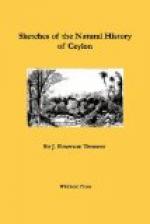At times the heat at Kornegalle is intense, in consequence of the perpetual glow diffused from these granite cliffs. The warmth they acquire during the blaze of noon becomes almost intolerable towards evening, and the sultry night is too short to permit them to cool between the setting and the rising of the sun. The district is also liable to occasional droughts when the watercourses fail, and the tanks are dried up. One of these calamities occurred about the period of my visit, and such was the suffering of the wild animals that numbers of crocodiles and bears made their way into the town to drink at the wells. The soil is prolific in the extreme; rice, cotton, and dry grain are cultivated largely in the valley. Every cottage is surrounded by gardens of coco-nuts, arecas, jak-fruit and coffee; the slopes, under tillage, are covered with luxuriant vegetation, and, as far as the eye can reach on every side, there are dense forests intersected by streams, in the shade of which the deer and the elephant abound.
In 1847 arrangements were made for one of the great elephant hunts for the supply of the Civil Engineer’s Department, and the spot fixed on by Mr. Morris, the Government officer who conducted the corral, was on the banks of the Kimbul river, about fifteen miles from Kornegalle. The country over which we rode to the scene of the approaching capture showed traces of the recent drought, the fields lay to a great extent untilled, owing to the want of water, and the tanks, almost reduced to dryness, were covered with the leaves of the rose-coloured lotus.
Our cavalcade was as oriental as the scenery through which it moved; the Governor and the officers of his staff and household formed a long cortege, escorted by the native attendants, horse-keepers, and foot-runners. The ladies were borne in palankins, and the younger individuals of the party carried in chairs raised on poles, and covered with cool green awnings made of the fresh leaves of the talipat palm.
After traversing the cultivated lands, the path led across open glades of park-like verdure and beauty, and at last entered the great-forest under the shade of ancient trees wreathed to their crowns with climbing plants and festooned by natural garlands of convolvulus and orchids. Here silence reigned, disturbed only by the murmuring hum of glittering insects, or the shrill clamour of the plum-headed parroquet and the flute-like calls of the golden oriole.
We crossed the broad sandy beds of two rivers over-arched by tall trees, the most conspicuous of which is the Kombook[1], from the calcined bark of which the natives extract a species of lime to be used with their betel. And from the branches hung suspended over the water the gigantic pods of the huge puswael bean[2], the sheath of which measures six feet long by five or six inches broad.
[Footnote 1: Pentaptera paniculata.]
[Footnote 2: Entada pursaetha.]




